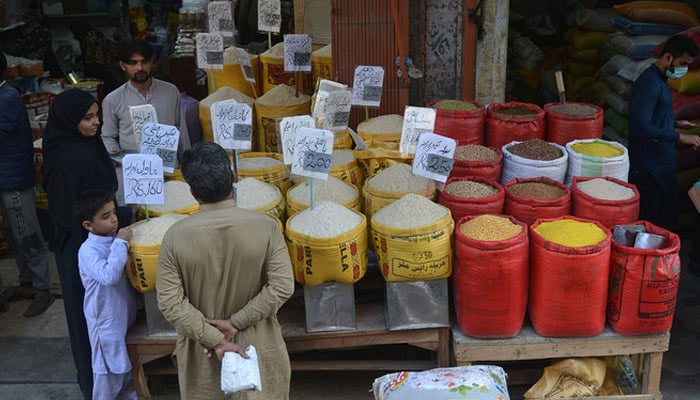Inflation in Pakistan to decrease to 15pc next year: ADB
According to the report, agricultural production and industrial sector are expected to improve this fiscal year
ISLAMABAD: In its annual Asian Development Outlook Report 2024, the Asian Development Bank (ADB) in it forecast stated that inflation is expected to decrease to 15.0 percent next year as progress on macroeconomic stabilisation restores confidence.
The ADB termed political unrest, devastating floods and policy slippage as major hurdles in Pakistan’s economic progress, citing uncertainty as a risk towards the country’s efforts for stabilisation, recovery and reforms.
“The economy contracted as devastating floods, political unrest and policy slippage curbed investment, consumption and production,” the report read, adding that the country’s GDP declined by 0.2 percent in fiscal year 2023 (FY2023, ended 30 June 2023) following 6.2 percent expansion in FY2022.
According to the regional development bank, private consumption growth, on the demand side, slipped to 2.4 percent from 7.1 percent in FY2022, reflecting higher living costs and slower nominal income growth amid a weakening of employment, while limited fiscal resources led to a 31.6 percent drop in public investment, while private investment fell by 14.6 percent, in line with the pessimistic outlook.
“A steep decline in imports from ad hoc import controls allowed net exports to contribute positively to growth,” it added.
The bank maintained that the growth in Pakistan is projected to grow by 1.9 percent this year, driven by a rebound in private sector investment linked to progress on reform measures and transition to a new and more stable government.
“In FY2025, growth is projected to reach 2.8 percent, driven by higher confidence, reduced macroeconomic imbalances, adequate progress on structural reforms, greater political stability, and improved external conditions,” the report added.
Growth has been affected by rising costs and tax hikes in the construction sector, it stated, while the deficit in Pakistan is expected to be at a high level of 25% this fiscal year. The ADB mentioned that Pakistan will have to rely on international financial institutions and friendly countries for external payments.
“Inflation reached a 5-decade high as supply disruption and currency depreciation propelled increases in food and energy prices,” the bank said in the report, adding that inflation rates will remain high at about 25 percent this year due to higher energy prices.
It further mentioned that prices of food commodities will stabilise next year.
“Inflation will remain elevated at about 25.0 percent in FY2024, driven by higher energy prices, but is expected to ease in FY2025.”
The bank maintained that while improvement in food supplies and moderation of inflation expectations will likely ease inflationary pressures, further increases in energy prices envisaged under the International Monetary Fund (IMF) Stand-by Agreement (SBA) are projected to keep inflation high.
According to the report, agricultural production and industrial sector are expected to improve this fiscal year. If the reforms are implemented, the economic recovery process will begin this year, it added.
In its report, the bank also stressed that there is a need to enforce measures for financial inclusion of women in Pakistan.
“While Pakistan’s overall financial inclusion has improved, the gender gap in account ownership more than doubled over the past decade, reaching 32 percent in 2021,” it stated.
Meanwhile, on the regional front, ADB said that developing economies in Asia and the Pacific are forecast to expand by 4.9% on average this year as the region continues its resilient growth amid robust domestic demand, improving semiconductor exports and recovering tourism. The wave of recession will ease in the region, it added.
-
 Leonardo DiCaprio's Girlfriend Vittoria Ceretti Given 'greatest Honor Of Her Life'
Leonardo DiCaprio's Girlfriend Vittoria Ceretti Given 'greatest Honor Of Her Life' -
 Beatrice, Eugenie’s Reaction Comes Out After Epstein Files Expose Their Personal Lives Even More
Beatrice, Eugenie’s Reaction Comes Out After Epstein Files Expose Their Personal Lives Even More -
 Will Smith Couldn't Make This Dog Part Of His Family: Here's Why
Will Smith Couldn't Make This Dog Part Of His Family: Here's Why -
 Kylie Jenner In Full Nesting Mode With Timothee Chalamet: ‘Pregnancy No Surprise Now’
Kylie Jenner In Full Nesting Mode With Timothee Chalamet: ‘Pregnancy No Surprise Now’ -
 Laura Dern Reflects On Being Rejected Due To Something She Can't Help
Laura Dern Reflects On Being Rejected Due To Something She Can't Help -
 HBO Axed Naomi Watts's 'Game Of Thrones' Sequel For This Reason
HBO Axed Naomi Watts's 'Game Of Thrones' Sequel For This Reason -
 King Charles' Sandringham Estate Gets 'public Safety Message' After Andrew Move
King Charles' Sandringham Estate Gets 'public Safety Message' After Andrew Move -
 Lewis Capaldi Sends Taylor Swift Sweet Message After 'Opalite' Video Role
Lewis Capaldi Sends Taylor Swift Sweet Message After 'Opalite' Video Role -
 Brooklyn Beckham Plunges Victoria, David Beckham Into Marital Woes: ‘They’re Exhausted As It Seeps Into Marriage
Brooklyn Beckham Plunges Victoria, David Beckham Into Marital Woes: ‘They’re Exhausted As It Seeps Into Marriage -
 Sarah Ferguson Joins Andrew In ‘forcing’ Their Daughters Hand: ‘She Can Lose Everything’
Sarah Ferguson Joins Andrew In ‘forcing’ Their Daughters Hand: ‘She Can Lose Everything’ -
 'Bridgerton' Author Reveals If Actors Will Be Recast In Future Seasons
'Bridgerton' Author Reveals If Actors Will Be Recast In Future Seasons -
 50 Cent Super Bowl Ad Goes Viral
50 Cent Super Bowl Ad Goes Viral -
 'The Housemaid' Lifts Company's Profits: Here's How
'The Housemaid' Lifts Company's Profits: Here's How -
 Michael Douglas Recalls Director's Harsh Words Over 'Wall Street' Performance
Michael Douglas Recalls Director's Harsh Words Over 'Wall Street' Performance -
 Henry Czerny On Steve Martin Created Humor On 'Pink Panther' Set
Henry Czerny On Steve Martin Created Humor On 'Pink Panther' Set -
 Lady Victoria Hervey: Andrew Mountbatten-Windsor's Ex-girlfriend Proud Of Being On Epstein Files
Lady Victoria Hervey: Andrew Mountbatten-Windsor's Ex-girlfriend Proud Of Being On Epstein Files




